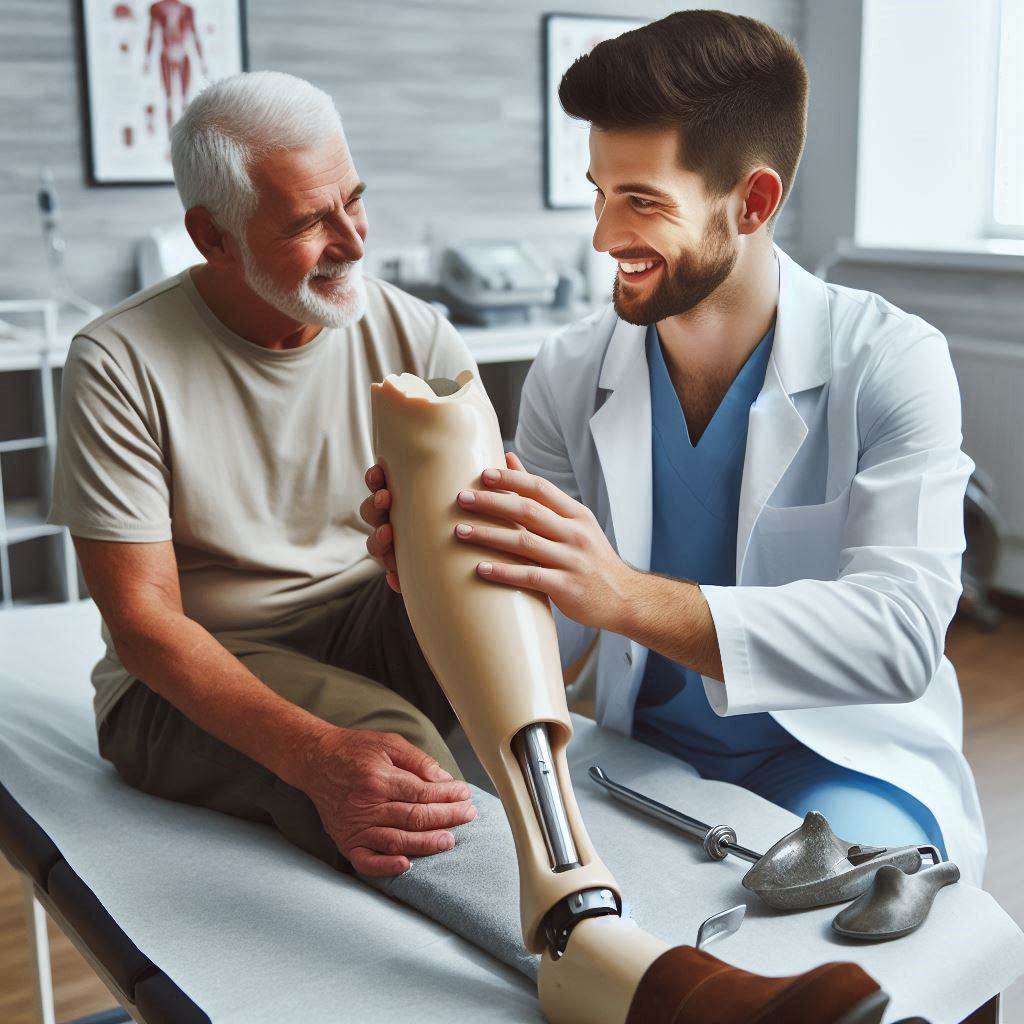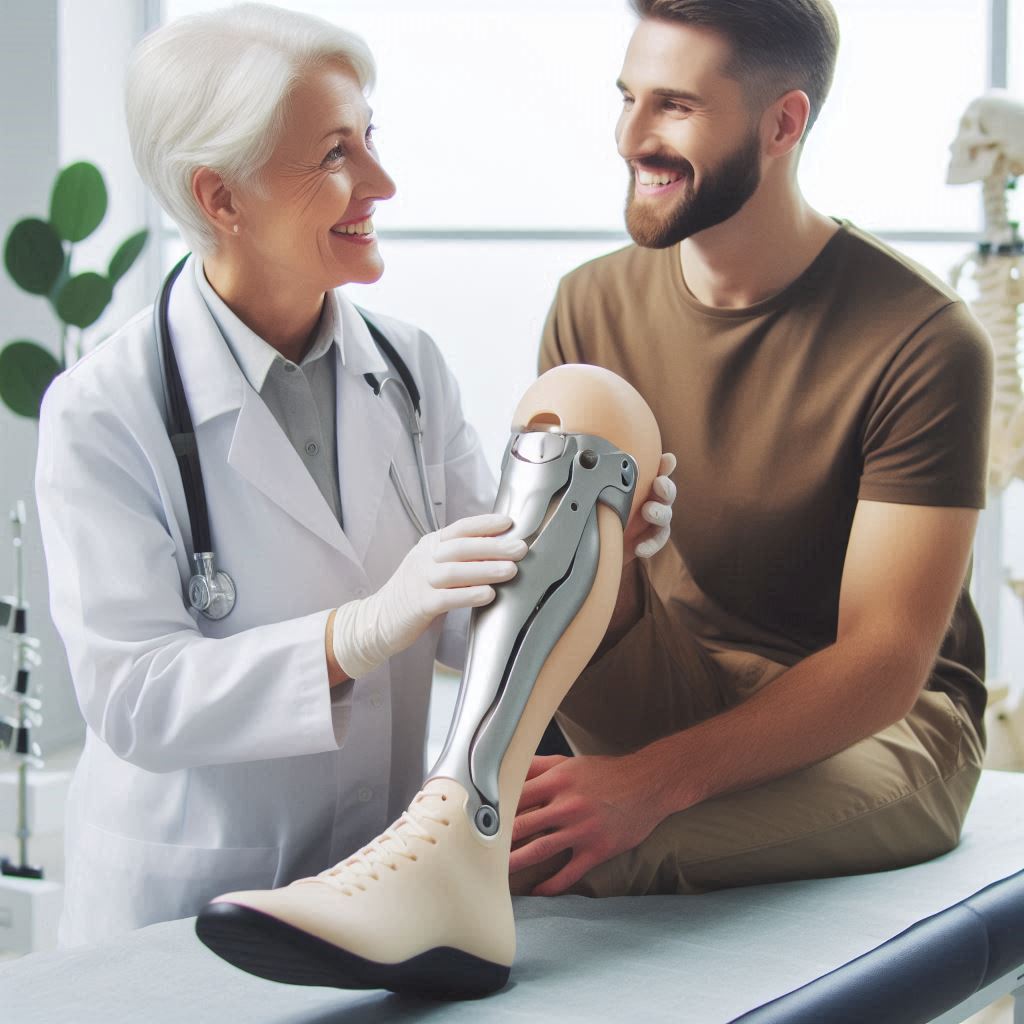Introduction
An orthopedic technologist assists orthopedic surgeons during medical procedures.
They specialize in orthopedic equipment and patient care.
Professional associations play a vital role in the orthopedic technologist field.
They provide networking opportunities for technologists to connect.
Associations offer access to continuing education and training.
This helps technologists stay updated with industry advancements.
Membership fosters collaboration and knowledge exchange among peers.
It promotes best practices in orthopedic technology.
Associations advocate for the profession’s interests and standards.
They support technologists in career development and advancement.
Engaging with associations enhances professional credibility and recognition.
It demonstrates commitment to excellence in patient care.
Technologists benefit from resources like research publications and guidelines.
These resources aid in delivering quality healthcare services.
Membership in associations offers opportunities for leadership roles.
It builds leadership skills and industry influence.
Associations organize conferences, workshops, and seminars.
These events provide platforms for learning and skill enhancement.
They address current issues and trends in orthopedic technology.
Networking at conferences strengthens professional relationships.
It opens doors to career opportunities and collaborations.
Joining associations expands access to job postings and career resources.
It facilitates mentorship opportunities for career growth.
Professional associations support technologists in navigating regulatory changes.
They advocate for policies that benefit healthcare providers.
Technologists gain insights into legislative developments affecting their practice.
Associations promote ethical standards and professional conduct.
They uphold integrity and accountability in patient care.
Membership fees often include benefits like insurance options and discounts.
What is a professional association?
Definition and Purpose of Professional Associations
A professional association is a group of individuals in a specific occupation who join together for a common goal.
These organizations aim to support, advocate for, and provide resources to professionals in a particular field.
They often offer networking opportunities, continuing education, and professional development resources.
Professional associations also serve as a platform for members to collaborate, share knowledge, and stay current in their field.
Benefits of Joining a Professional Association as an Orthopedic Technologist
- Networking Opportunities: Joining a professional association allows orthopedic technologists to connect with industry peers and experts.
- Continuing Education: Many associations offer access to workshops, seminars, and conferences to help members stay up-to-date in the field.
- Professional Development: Associations provide resources for career advancement, including certifications, training programs, and mentorship opportunities.
- Advocacy: Professional associations advocate for the interests of their members, helping to shape policies and regulations that affect the profession.
- Credibility: Being part of a recognized professional association can enhance an orthopedic technologist’s credibility and reputation in the industry.
- Access to Resources: Members have access to industry-specific resources, research, and publications to support their practice.
- Community Support: Associations create a community where members can seek support, guidance, and advice from their peers.
- Career Opportunities: Association membership can open doors to job opportunities, partnerships, and collaborations within the industry.
- Leadership Opportunities: Members can get involved in leadership roles within the association, gaining valuable experience and recognition.
- Professional Recognition: Being part of a professional organization demonstrates a commitment to the field and the highest standards of practice.
Generally, joining a professional association as an orthopedic technologist can offer numerous benefits, including networking opportunities, access to continuing education, career advancement resources, and advocacy support.
These associations provide a platform for professionals to connect, learn, and grow in their field, ultimately contributing to their success and the advancement of the orthopedic technology profession.
Read: The Role of Technology in Modern Sonography
List of Professional Associations for Orthopedic Technologists
Orthopedic technologists have the opportunity to join various professional associations that cater to their specific field.
These associations provide networking opportunities, continuing education, resources, and support for professionals working in the orthopedic technology field.
National Association of Orthopedic Technologists (NAOT)
- NAOT is a prominent professional association for orthopedic technologists in the United States.
- The mission of NAOT is to promote excellence in orthopedic technology through education and advocacy.
- NAOT’s goals include providing professional development opportunities, advocating for the profession, and fostering a sense of community among orthopedic technologists.
Orthopedic Technologists of Canada (OTC)
- OTC is the leading professional association for orthopedic technologists in Canada.
- The mission of OTC is to advance the practice of orthopedic technology in Canada through education and collaboration.
- OTC’s goals include promoting best practices in orthopedic technology, advocating for the profession, and supporting the professional development of its members.
International Society of Orthopedic Technologists (ISOT)
- ISOT is a global professional association for orthopedic technologists from around the world.
- The mission of ISOT is to promote the highest standards of orthopedic technology on an international level.
- ISOT’s goals include facilitating collaboration and communication among orthopedic technologists worldwide, promoting education and research in the field, and advocating for the profession globally.
These professional associations play a crucial role in supporting orthopedic technologists in their career development and ensuring high standards of practice in the field of orthopedic technology.
Read: Understanding Ultrasound Technician Certifications
Membership requirements
Eligibility criteria for joining professional associations
Becoming a member of a professional association as an orthopedic technologist typically requires meeting specific eligibility criteria.
These often include holding relevant educational qualifications and demonstrating active practice in the field.
Additionally, many associations require candidates to hold certification relevant to orthopedic technology and to adhere to stringent ethical standards in their practice.
Membership fees and benefits
Membership in orthopedic technologists’ associations typically involves paying moderate fees.
In return, members gain access to a wide array of benefits designed to support their professional development.
These benefits commonly include opportunities to attend networking events, conferences, and workshops.
Members also receive subscriptions to industry-leading journals and newsletters, ensuring they stay abreast of the latest advancements and research in orthopedic technology.
Continuing education opportunities and resources offered
Professional associations for orthopedic technologists are renowned for their robust offerings in continuing education.
Members have access to a plethora of resources, including seminars and webinars that cover cutting-edge techniques and emerging technologies in the field.
These educational opportunities are often provided at discounted rates for members, facilitating ongoing learning and skill development throughout their careers.
By joining professional associations, orthopedic technologists not only access valuable networking opportunities but also contribute to the development of industry standards and best practices.
They can engage in committees and task forces that shape policies and guidelines relevant to their profession.
This involvement not only enhances their professional standing but also allows them to play an active role in advancing orthopedic technology as a whole.
In addition to networking and professional advocacy, these associations serve as advocates for the orthopedic technology profession on broader platforms.
They engage in advocacy efforts at governmental and regulatory levels, ensuring that the interests and concerns of orthopedic technologists are represented and addressed.
This advocacy work helps promote greater recognition and respect for orthopedic technologists within the larger healthcare community.
In summary, joining a professional association as an orthopedic technologist offers numerous advantages.
From networking and continuing education to advocacy and professional development, these associations provide essential support throughout technologists’ careers.
They empower members to stay informed, connected, and influential in shaping the future of orthopedic technology.
Read: Preparing for a Sonography Job Interview: Tips

Networking opportunities
Networking is a cornerstone of success for orthopedic technologists, offering avenues to expand their professional reach and knowledge base.
It involves establishing and nurturing relationships with peers, mentors, and potential employers within the orthopedic technology community.
Importance of networking in the field of Orthopedic Technology
Networking is essential in orthopedic technology as it fosters collaboration, knowledge exchange, and professional growth.
Through networking, technologists gain insights into emerging trends, best practices, and innovations in the field.
This ongoing exchange of information helps them stay informed and adaptable in a rapidly evolving healthcare landscape.
Events, conferences, and workshops organized by professional associations
Professional associations play a pivotal role in organizing events that cater specifically to orthopedic technologists.
These events include annual conferences featuring keynote speakers, workshops focused on advanced techniques, and seminars covering relevant topics such as patient care protocols and technological advancements.
Attending these gatherings provides technologists with opportunities to learn from industry leaders, participate in discussions, and stay updated on the latest research.
Connecting with other professionals in the field
Participating in professional association events allows orthopedic technologists to connect with a diverse network of professionals.
They can engage with experts from various practice settings, including hospitals, clinics, and research institutions.
These interactions facilitate the exchange of ideas, best practices, and practical insights into handling complex cases and challenges within orthopedic technology.
Networking also nurtures mentorship relationships, where experienced technologists mentor younger or less experienced peers.
This mentorship is invaluable for career guidance, skill development, and navigating professional challenges.
It helps bridge knowledge gaps and encourages continuous learning and improvement within the field.
By actively participating in networking activities facilitated by professional associations, orthopedic technologists not only enhance their career prospects but also contribute to the advancement of orthopedic technology as a whole.
They gain access to a supportive community that shares their passion for improving patient care and advancing healthcare practices.
In summary, networking is fundamental to the professional success and development of orthopedic technologists.
It enables them to build meaningful connections, stay current with industry trends, and collaborate with peers towards improving patient outcomes and advancing orthopedic care.
Read: Best Study Resources for Surgical Technologist Students
Professional development resources
When it comes to professional development in the field of orthopedic technology, professional associations play a crucial role.
These organizations offer a wide range of resources and opportunities for orthopedic technologists to enhance their skills, stay current with industry trends, and advance in their careers.
Training Programs and Certification Opportunities
Professional associations provide orthopedic technologists with access to various training programs and certification opportunities, which can help them improve their knowledge and skills.
These programs are designed to ensure that technologists stay up-to-date with the latest advancements in the field and maintain a high level of competency.
Access to Resources
Members of professional associations have access to a wealth of resources such as journals, publications, and research materials.
These resources can help technologists stay informed about new developments in orthopedic technology, learn best practices, and access the latest research findings.
Career Advancement Opportunities
Professional associations also provide orthopedic technologists with opportunities for career advancement.
By networking with other professionals in the field and participating in association events, technologists can learn about new job opportunities, expand their professional network, and advance in their careers.
Overall, professional associations are invaluable to orthopedic technologists looking to enhance their skills, stay current with industry trends, and advance in their careers.
By taking advantage of the resources and opportunities provided by these associations, technologists can position themselves for success in their field.
Transform Your Career Today
Unlock a personalized career strategy that drives real results. Get tailored advice and a roadmap designed just for you.
Start NowAdvocacy and support
Professional associations play a crucial role in advocating for the orthopedic technologist profession.
These organizations work to promote the interests and rights of orthopedic technologists by providing representation and support.
Role of professional associations in advocating for the profession
Professional associations serve as the voice of orthopedic technologists in the healthcare industry.
They advocate for the recognition of the profession and work to ensure that orthopedic technologists are valued members of the healthcare team.
These associations lobby for legislative changes that benefit orthopedic technologists and advocate for policies that support the growth and development of the profession.
By partnering with other healthcare organizations and stakeholders, professional associations can amplify their advocacy efforts and bring about positive change for orthopedic technologists.
Support services and resources offered to Orthopedic Technologists
Professional associations provide a wide range of support services and resources to orthopedic technologists.
These include continuing education opportunities, professional development resources, and networking events.
Additionally, professional associations offer job placement assistance, mentorship programs, and access to industry publications and research.
By providing these support services, professional associations help orthopedic technologists stay current in their field and advance their careers.
Influence on policy-making and industry standards
Professional associations play a key role in shaping policy-making and industry standards for orthopedic technologists.
These organizations work to establish guidelines and best practices that ensure the highest level of care for patients.
By working collaboratively with regulatory bodies and industry stakeholders, professional associations can influence the development of policies that impact the practice of orthopedic technology.
This advocacy helps protect the interests of orthopedic technologists and ensures that they are practicing in a safe and effective manner.
Most importantly, professional associations are essential for advocating for the orthopedic technologist profession, providing valuable support services and resources, and influencing policy-making and industry standards.
Orthopedic technologists can benefit greatly from joining and actively participating in these associations to advance their careers and contribute to the growth of the profession.
Conclusion
Orthopedic Technologists can benefit from joining professional associations in many ways.
These organizations provide opportunities for networking, continuing education, and staying current with industry trends.
One key association for Orthopedic Technologists is the National Association of Orthopaedic Technologists (NAOT).
Members have access to resources, conferences, and certification opportunities.
Another important organization is the American Society of Orthopedic Professionals (ASOP).
ASOP offers workshops, webinars, and a certification program for its members.
Professional associations help Orthopedic Technologists stay informed about the latest advancements in the field.
They also provide a platform for sharing best practices and collaborating with colleagues.
By participating in these associations, Orthopedic Technologists can enhance their skills, expand their knowledge, and advance their careers.
Joining a professional organization can lead to increased job opportunities and recognition within the industry.
In closing, professional associations play a vital role in the career development of Orthopedic Technologists.
By joining these organizations, technologists can access valuable resources and networking opportunities.
I strongly encourage Orthopedic Technologists to consider becoming members of professional associations as they strive for growth and success in their careers.




